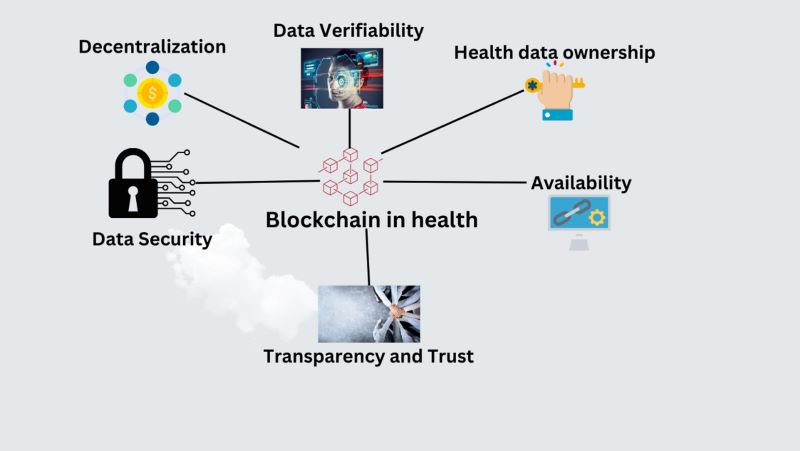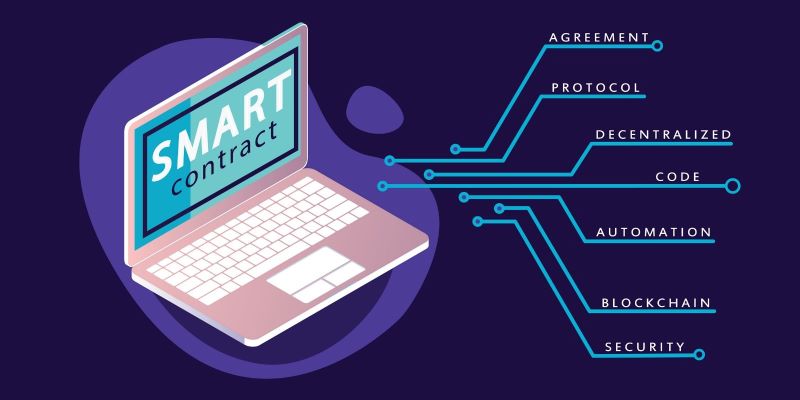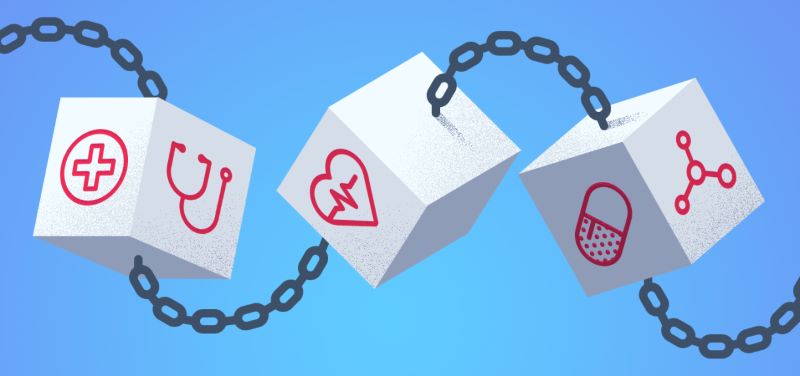Wondering “How can blockchain improve patient data security“? In a world where data hacks are rampant, blockchain emerges as a game-changer for safeguarding our health information. Imagine your medical records locked down tighter than ever! Get ready to explore how this revolutionary technology can be a healthcare hero.
Understanding Blockchain Security in Healthcare
The Fundamentals of Blockchain Technology in Healthcare
Blockchain can truly change how we keep health records safe. Think of it as a digital ledger. Just like a notebook that records every transaction. Each patient’s info gets its own page, called a block. And this block connects securely to the rest of the notebook.
This link is what makes blockchain special. One block changes, they all must change. This is hard to do without being seen. So it keeps data safe. It helps stop bad people from sneaking in and changing things. No one owns this notebook. So, none can make changes alone. It’s a team effort to keep everything correct and safe.
Now, you might worry about privacy. How does this ledger stay private? Well, each piece of info gets a special code. This code hides the real details. Only certain people can unlock this code with a key. This way, doctors can share what they need without risk.
HIPAA Compliant Blockchain Solutions for Patient Data
How do we follow rules like HIPAA with blockchain? It’s simple, in a way. HIPAA asks for patient data to be private and safe. Blockchain answers this call. It locks down info and tracks who looks at it. This trace is clear and honest.
A patient’s info doesn’t change, or, becomes ‘immutable’. Once it’s recorded, it sits still. It’s like writing in pen that never fades. Even better, smart contracts can manage who gets to peek. These are like computer programs that enforce rules. If a rule isn’t met, access is a no-go.
This is good news. It means we can cut down on fraud and needless copying of files. Mistakes can drop big time too. Plus, patients can say ‘yes’ or ‘no’ to who sees their details. And blockchain makes sure their choice is heard every time.
Cyber threats are real. They’re scary. But blockchain is a strong shield. It’s not only a guard. It’s a way to keep health data not only safe but also easy to handle. Coming up with good blockchain methods is my life’s work. It’s a passion and a duty. I aim to make it so we can trust our health records like we trust the sun to rise.
In short, this tech brings power to the people. Patients get more say over their records. And we, the protectors of this data, sleep better at night. This new world is exciting. It’s a challenge too. But one we’re ready to face head-on with blockchain.
The Real-World Benefits of Blockchain for Health Records
Enhancing Patient Medical Records Security
You might wonder, how safe are your medical records? Not enough, until now. With blockchain, we boost health records’ safety. This new tech fights hacks and keeps data locked tight. Imagine a vault, one that’s near impossible to crack. That’s blockchain for patient details.
Blockchain makes a network of many records. Each is linked and secure. It keeps a close watch on who sees your health data. If anyone tries to change your records wrongly, blockchain spots it fast. It’s like having a guard who never blinks.
You control who sees your info. You say yes or no to accessing your health details. This is huge for privacy. With blockchain, we make sure only the right eyes see your records. Picture giving a key only to those you trust. That’s what blockchain does for your medical data.
Decentralized Patient Data Systems and Data Privacy
But why decentralization? It spreads your data across many places. No one person holds all your health secrets. It’s not in just one computer. It’s in many, and that’s good for keeping it safe. It’s like hiding your money not under one mattress but many.
This spread-out system is a shield against leaks. It’s hard for bad guys to take what they can’t find all in one spot. It’s almost like a game of hide and seek with your data. And in this game, your data is a champ, staying hidden.
Blockchain also means a clear record, a ledger of who looks at your data. You can see this ledger anytime. You check who peeked and when. Think of it as a diary that notes every peek at your records. Handy, right? It shows you who’s been where in your medical history.
Encryption is another win. It scrambles your data into a secret code. Only those with the key, like your doctor, can read it. It’s like writing a secret note that only your best friend can read. With blockchain, that’s how we send and store your health facts.
So, yes, blockchain can make your patient data close to unhackable. It beefs up security like a digital fortress. This is a big step in the right fight – keeping your health records safe and sound. With blockchain, it’s not just about locking doors. It’s about making sure the keys are in the right hands.
Implementing Smart Contracts and Cryptography
Smart Contracts for Medical Records Management
Imagine having a bodyguard for your health records. That’s what smart contracts on blockchain do. They set up rules that must be followed for your personal health info. Just like a bodyguard, they are always on duty, making sure your data is safe and only goes to those with your okay.
When you visit the doctor, your info gets updated. These smart contracts make the update process smooth and error-free. They make sure no wrong details slip through. They’re a big part of keeping your medical record up-to-date and in the right hands. Also, they help doctors, hospitals, and insurance companies talk to each other without mix-ups.
With smart contracts, we can track every step. This means less chance for mistakes or misuse of info. Plus, you get a say in who sees your records. It’s a new level of power for you over your health info.
Cryptography in Patient Data Security and Integrity
Now, let’s talk about keeping that precious health info secret and safe. Cryptography is like a secret code for your health data. It scrambles info so only those who should see it, can.
When your health details are sent across the internet, they are safe. They travel in code – unreadable to sneaky eyes trying to peek. If someone steals it, they can’t read it. It’s gibberish without the key. Only the right doctor can turn it back into info they can use.
This coding also makes sure the info stays exactly as it is – no changes. This way, you can trust it’s all correct and nothing’s been tampered with. Think of it as a wax seal on an old letter. It proves it hasn’t been opened by anyone else.
So, blockchain uses smart contracts and super-smart codes to protect your health records. It’s like having a digital lock and key for your most private info. We keep it from falling into the wrong hands or getting changed sneakily. And it’s all part of making healthcare better, safer, and more private for you.
Future of Healthcare Data Management with Blockchain
Blockchain’s Role in Secure Health Data Exchange
You wonder, “Can blockchain make patient data safe?” Yes. Blockchain in healthcare means your private info can stay secure. It’s like a lockbox that only you have the key to. We use blockchain to stop hackers and keep data safe.
Blockchain is not just one computer but many. They all have the same info. If someone tries to change the data, the others will see it. It’s because they all check with each other. This way, mistakes or lies are easy to spot. Your health info stays correct and private. This is how we make sure nobody messes with your health records.
We encrypt your data too. This means we turn it into a secret code. Only people who should see it can understand it. Even if bad guys get it, they can’t read it. It’s all to keep you and your info safe.
We also use smart contracts. These are like automatic rules that help manage your health info. They make sure everything is done right without anyone having to watch over it.
Harnessing Blockchain for Interoperability and Compliance in Health Informatics
Health info needs to work well together. This is called interoperability. It means doctors and hospitals can share your health info fast and safely. With blockchain, this gets easier. It’s because blockchain uses special rules that everyone agrees on. This helps your doctors get your health info when they need it.
HIPAA is a big deal in health info. It’s a law that helps keep your patient info safe. We build our blockchain to follow HIPAA rules. So, when we put your info on the blockchain, we are very careful. We make sure it’s all legal and safe.
We also check who can see or change your data. This is important so bad guys can’t get it. And if they do, we’ll know. We can track what happens with your info. This keeps everything clear and in the open.
Lastly, we work on making sure your health info stays the same, always. This means it can’t change without permission. It’s what we call data immutability. With blockchain, once your health info is saved, it stays like that. No more worries about someone changing or deleting your info.
All this talk might sound like a lot. But know this – blockchain helps keep your health info safe and sound. It’s a team effort to guard your privacy and keep everything running smooth. With experts, like me and others, we’re turning this dream into reality, one block at a time.
In this post, we’ve dug deep into how blockchain beefs up healthcare security. We started off by breaking down blockchain basics and how they fit with keeping patient data safe. Then, we talked about HIPAA and making blockchain work without breaking rules.
Next up, we explored the real wins of using blockchain for health records—better security and keeping private stuff private. We saw how spreading out patient data can actually keep it safer.
We also looked at smart contracts and cryptography. These high-tech tools are ace at managing records and keeping data honest and untouched.
Lastly, we peeked into the future—blockchain is going to change how we swap health info, and make different systems work together smoothly and by the book.
The blockchain train is just leaving the station in healthcare. It’s loaded with ways to lock down our health data good and tight. To learn more about how blockchain is transforming healthcare, visit Blockchain Global Network.
Q&A :
- How does blockchain technology enhance the security of patient data?
Blockchain technology can significantly bolster the security of patient data through its decentralized nature which eliminates single points of failure, ensuring data is not centrally vulnerable. Additionally, its cryptographic hashing and immutable ledger ensure that once patient data is recorded, it cannot be altered or deleted, thus preventing unauthorized changes and potential data breaches.
- What are the benefits of using blockchain for healthcare data management?
Utilizing blockchain for healthcare data management presents numerous benefits, such as increased trust and transparency between patients and healthcare providers, improved data interoperability, and the facilitation of secure data sharing. Moreover, blockchain can streamline compliance with regulations like HIPAA, as the technology supports audit trails and data provenance.
- Can blockchain technology ensure the privacy of sensitive patient information?
Yes, blockchain technology can ensure the privacy of sensitive patient information by employing encryption and granting access to patient data only through private keys. This selective visibility means that only individuals with the required authorization can access the patient’s personal health information, thus preserving patient confidentiality.
- How can blockchain be integrated into existing healthcare systems to protect patient data?
Blockchain can be integrated into existing healthcare systems through the use of APIs and smart contracts, which can mediate data access and automate the sharing process while maintaining robust security protocols. Health IT developers can create systems that interface with the blockchain, ensuring current infrastructure can benefit from blockchain’s secure environment for data exchange.
- What are the challenges faced in adopting blockchain for patient data security?
While blockchain offers numerous advantages for patient data security, there are challenges in its adoption, including the need for regulatory clarity, the potential for high initial implementation costs, and ensuring scalability to handle large volumes of health data transactions. Moreover, there needs to be widespread stakeholder agreement to adopt a standardized form of the technology across different healthcare institutions.





RELATED POSTS
Easily Join the TENEO Airdrop with This Step-by-Step Guide
The TENEO Airdrop is a...
Deflationary Currency – How it works and its impact on the Economy
In today’s evolving financial landscape,...
What is Consensus? Consensus Mechanisms in Blockchain
In the world of cryptocurrency,...
Vessel Finance: The DEX with near-zero gas fees
In the ever-evolving world of...
Innovation in Blockchain Security: How Attacks Are Sparking Genius Breakthroughs
"Innovation in blockchain security due...
What is ACA Coin? Learn about Acala Network Token
ACA Coin is a vital...
What is Optimism? A promising Layer 2 solution for Ethereum
Ethereum is facing scalability challenges,...
What is a Bullish Run? Exploring Its Impact on Investment Strategies
What is a Bullish Run?...
Crypto news predictions – Key Trends in the future
Crypto news predictions are essential...
New Threats to Blockchain Security: Are Your Investments at Risk?
Protect Your Blockchain: New Threats...
Blockchain Breakthroughs: Blockchain Trends And Predictions In Financial Services
Discover the latest trends and...
What is a honeypot in Crypto? Unveiling the Deceptive Traps!
What Is a Honeypot in...
How to Participate in the Avail Airdrop and Earn $AVAIL Tokens Breakthrough
Avail Airdrop offers a simple...
How does blockchain technology help organizations when sharing data
Wondering “How does blockchain technology...
Crypto coin lead in: Important details for investors
In the fast-paced world of...
Inflation is down why isnt crypto rallying today?
Inflation is down why isnt...